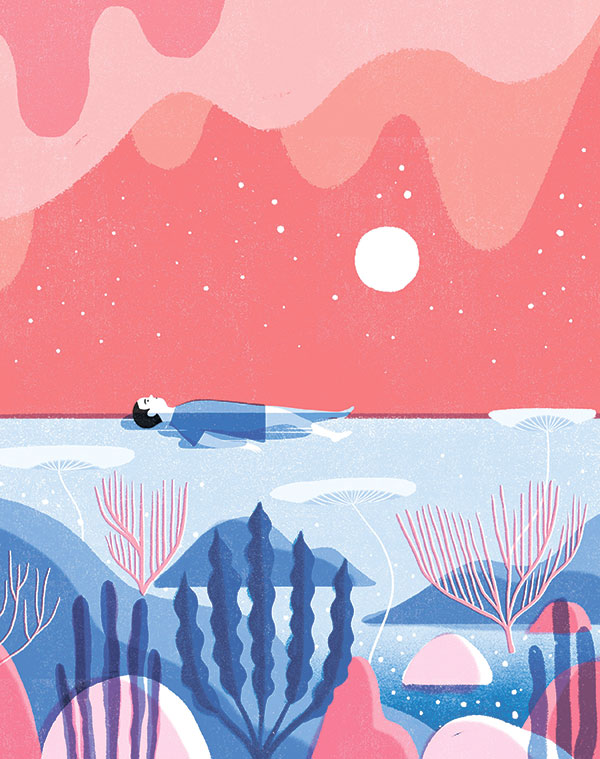You can never run away from the sea
By Marc Abuan
“YOU can’t run away from the sea,” Papa said, towing him into the slippery weeded seabed, at the peak of day. “Not especially if you’re a Cebuano.”

This was the first time they went to the beach out of ceremony. Papa’s granddad, he says, had them thrown off a cliff and into the sea to make a point- that the only way out is to just keep going. No paid lessons. This was how they were taught to swim back in the late 60s.
To the boy this was weird since his idea of a father was a phantom — a fresh-smelling suitcase filled with chocolates and VCDs and the sounds of ripping packaging tape in the living room, and the scent of corned beef and eggs wafting through the air in the morning. This was a man the boy barely knew, and wading out in the sea with him felt like a test of trust.
Every step was a tighter ribcage, as if the sea was hugging him closer every time he takes another stride. This was the first, and only summer the boy will remember that his father had taught him how to swim.
In those days the boy had lived in a two-story wooden house hidden in the small back streets close to the old city center. He had grown to love the lazy humid summers in that house, where afternoons were Geneva Conventions of different barangay boys, representatives from Kalubihan, from Echavez, from Taga Ubos Merkado, and they’d congregate over Ghost Fighter and fight battles fought with luthang. The boy will have spent his childhood years with no fond summer memories of the sea.
Though papa was leading the way, the boy felt frightened when the hugging of the water soon turned into choking. It has become a battle between two things: for air and for a solid landing step.
The boy had to choose one. From under the water he can see his father’s feet planted firmly on the under-sea sand.
It was said among the secret society of newly foreskin-deprived boys that the seawater makes your dick wound heal faster. Before he had his manhood mutilated, he had seen those boys in the big shirts, pinching the front side as if it was a tent-pitch, walk out into the water and scream for mama out of mixed pain and laughter. But in a few weeks, they’d be back wearing shorts again, and a couple months later their voices turned a deep tenor. To the boy, this ceremony was something that was waiting to happen — and he can never run from it — the eventual, certain kind of pain, and the only way to fix it fast was to let it be under the sea.
When his time had come, he was petrified with the idea that blood is barbeque smoke for sharks.
The boy shivered at the idea of jaws coming for his johnson as he was healing himself in the saltwater. So after he was cut, he laughed, went home, and played Mortal Kombat all afternoon.
This was how he spent one summer.
“You can’t run away from the sea, not especially if you’re a Cebuano,” his father said once, yet it was as if, somehow, he had run away from the sea all his life.
In his teenage years he never had stories to write about the sea. Nobody ever took him to the water, nor did he feel like he ever needed it at all. He felt more strongly about the verdant green canopies of the tropical acacia trees and the earthy scent of the soil in a blue camping morning, where they’d spend three days lost in the mountain wildnernesses of Camps Arbilo and Poliquit building camps out of bamboo poles and twine ropes. And on doggier dog days, he’d spend sleepy afternoons lovingly tending to his virtual cities in Sim City. The sea to him, was a neighbor who he never took the time to know.
The excuses were stronger than all the convincing combined. He ran away from the water when he knew that they had to swim across a lake, back and forth, to earn a water survival badge. The boy’s reluctance cost him the eagle scout rank.
His arms out into the water, Papa pulled out the boy to the surface and told him to lie down in the water and float. The boy did so, and he can only hear the muffled sounds of the splashing water in his ears. His arms and legs tensed and relaxed in the water, and he can hear himself breathe viciously in the silence. He was staring into the great azure expanse that was the sky and the huge ball of light right above him. It was the same blue sky. The very same sky that will watch him make the same mistakes, over and over again.
The boy will have dated a couple of girls who loved the sea, and he will have to write poetry about how they reminded him of the waves and the blue, and the image of the sunset breaking into millions of reflections into the dark, as if he knew what all of that meant. But that’s what young boys do when they fall, they try to become the women they love.
The boy will fall in love along the shores of Basdaku. He will make promises that he will bleed for and lose sleep over. He will have to cross the sea to show how a girl really meant to him, as earnest and passionate as a midnight fever dream. And inevitably, he will fall out of love in the water in Samboan, getting so drunk at nine in the morning and rabidly throwing his cellphone from inside a moving car. Years later, the boy’s friends will joke about how he’d break phones every time he’d break his heart. The sea gives, and the sea takes away, but nothing will ever be the same.
He will find solace in the seclusion of Malapascua, where he shared stories with children on the sand, taught them how to sing, and painted walls with thresher sharks and the treasure they didn’t know they had. In that very island he will realize that he was young and full of life, and it was a gift that had to be burnt like a candle lit on both ends. It was over beer and under the stars that, his life’s gears were turning.
Down south in Alcoy he will call a girl and say that he’s had too much alcohol, and he’ll say he’s sorry, then a year later, they’ll be together.
But the boy never thought he owed these stories to the sea, when it seemed like it came for him to change his life in its mysterious, subtle waves.
The day the boy learned to float was the last day his father taught him anything he kept to heart. In the following years, the boy will staunchly refuse anything the sea taught him — resent it, deny it, walk away from it. He will distance himself from the sublime power of the ocean, tell everyone that he never needed it, he never sought for it, that it never healed him or gave him anything to remember. He never tried to learn to swim. He never tried to understand it as it is, yet he will write lines of lies blinded by his idea of a comforting, forgiving sea that he called his own.
Yet the boy never realized that it was the sea that came to him when he sought for love, and gave him comfort when he lost it. It was the sea that, in its absence, helped him become his own person.
It came in undulating waves, when there were points in his life where it came for him, and some when it retreated for him to seek. The city by the sea, and all the little boys in it will dream about the deep and the shoreline in their sleep, dozing off to the rhythm of the crashing waves. In the life of every Cebuano boy, the sea will come and speak to him, and he will never be the same.
He learned to float, and it was the moment the boy then realized his father was right, that you can never run away from the sea — especially if you’re a Cebuano.



